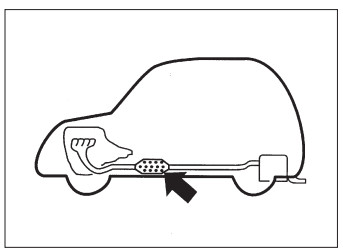The purpose of the catalytic converter installed on your vehicle is to convert exhaust pollutants to harmless water vapour, carbon dioxide, and nitrogen. Use of leaded fuel in vehicles equipped with catalytic converters is prohibited, because lead deactivates the pollutant-reducing components of the catalyst system.
It is very important to keep the engine properly tuned. Engine misfiring, which can result from an improperly tuned engine, may cause overheating of the catalyst. This may result in permanent heat damage to the catalyst and other vehicle components.

To minimize the possibility of catalyst or other vehicle damage:
- Maintain the engine in the proper operating condition.
- In the event of an engine malfunction, particularly one involving engine misfire or other apparent loss of performance, have the vehicle serviced promptly.
- Do not turn off the engine or interrupt the ignition when the
transmission is in gear and the vehicle is in motion. - Do not try to start the engine by pushing or towing the vehicle, or
coasting down a hill. - Do not idle the engine with any spark plug wires disconnected or
removed, such as during diagnostic testing. - Do not idle the vehicle for prolonged periods if idling seems
rough or there are other malfunctions. - Do not allow the fuel tank to get near the empty level.
Be careful where you park and drive; the catalytic converter and other exhaust components can get very hot. As with any vehicle, do not park or operate this vehicle in areas where combustible materials such as dry grass or leaves can come in contact with a hot exhaust system.